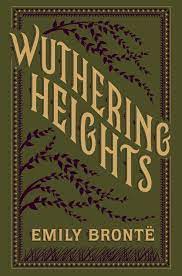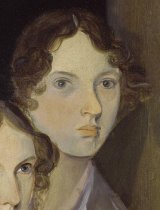Wuthering Heights Page #33
Wuthering Heights is an 1847 novel by Emily Brontë, initially published under the pseudonym Ellis Bell. It concerns two families of the landed gentry living on the West Yorkshire moors, the Earnshaws and the Lintons, and their turbulent relationships with Earnshaw's adopted son, Heathcliff.
“Remain where you are, Catherine,” he said; without any anger in his voice, but with much sorrowful despondency. “I shall not stay. I am neither come to wrangle nor be reconciled; but I wish just to learn whether, after this evening’s events, you intend to continue your intimacy with—” “Oh, for mercy’s sake,” interrupted the mistress, stamping her foot, “for mercy’s sake, let us hear no more of it now! Your cold blood cannot be worked into a fever: your veins are full of ice-water; but mine are boiling, and the sight of such chillness makes them dance.” “To get rid of me, answer my question,” persevered Mr. Linton. “You must answer it; and that violence does not alarm me. I have found that you can be as stoical as anyone, when you please. Will you give up Heathcliff hereafter, or will you give up me? It is impossible for you to be my friend and his at the same time; and I absolutely require to know which you choose.” “I require to be let alone!” exclaimed Catherine, furiously. “I demand it! Don’t you see I can scarcely stand? Edgar, you—you leave me!” She rang the bell till it broke with a twang; I entered leisurely. It was enough to try the temper of a saint, such senseless, wicked rages! There she lay dashing her head against the arm of the sofa, and grinding her teeth, so that you might fancy she would crash them to splinters! Mr. Linton stood looking at her in sudden compunction and fear. He told me to fetch some water. She had no breath for speaking. I brought a glass full; and as she would not drink, I sprinkled it on her face. In a few seconds she stretched herself out stiff, and turned up her eyes, while her cheeks, at once blanched and livid, assumed the aspect of death. Linton looked terrified. “There is nothing in the world the matter,” I whispered. I did not want him to yield, though I could not help being afraid in my heart. “She has blood on her lips!” he said, shuddering. “Never mind!” I answered, tartly. And I told him how she had resolved, previous to his coming, on exhibiting a fit of frenzy. I incautiously gave the account aloud, and she heard me; for she started up—her hair flying over her shoulders, her eyes flashing, the muscles of her neck and arms standing out preternaturally. I made up my mind for broken bones, at least; but she only glared about her for an instant, and then rushed from the room. The master directed me to follow; I did, to her chamber-door: she hindered me from going further by securing it against me. As she never offered to descend to breakfast next morning, I went to ask whether she would have some carried up. “No!” she replied, peremptorily. The same question was repeated at dinner and tea; and again on the morrow after, and received the same answer. Mr. Linton, on his part, spent his time in the library, and did not inquire concerning his wife’s occupations. Isabella and he had had an hour’s interview, during which he tried to elicit from her some sentiment of proper horror for Heathcliff’s advances: but he could make nothing of her evasive replies, and was obliged to close the examination unsatisfactorily; adding, however, a solemn warning, that if she were so insane as to encourage that worthless suitor, it would dissolve all bonds of relationship between herself and him. CHAPTER XII While Miss Linton moped about the park and garden, always silent, and almost always in tears; and her brother shut himself up among books that he never opened—wearying, I guessed, with a continual vague expectation that Catherine, repenting her conduct, would come of her own accord to ask pardon, and seek a reconciliation—and she fasted pertinaciously, under the idea, probably, that at every meal Edgar was ready to choke for her absence, and pride alone held him from running to cast himself at her feet; I went about my household duties, convinced that the Grange had but one sensible soul in its walls, and that lodged in my body. I wasted no condolences on Miss, nor any expostulations on my mistress; nor did I pay much attention to the sighs of my master, who yearned to hear his lady’s name, since he might not hear her voice. I determined they should come about as they pleased for me; and though it was a tiresomely slow process, I began to rejoice at length in a faint dawn of its progress: as I thought at first. Mrs. Linton, on the third day, unbarred her door, and having finished the water in her pitcher and decanter, desired a renewed supply, and a basin of gruel, for she believed she was dying. That I set down as a speech meant for Edgar’s ears; I believed no such thing, so I kept it to myself and brought her some tea and dry toast. She ate and drank eagerly, and sank back on her pillow again, clenching her hands and groaning. “Oh, I will die,” she exclaimed, “since no one cares anything about me. I wish I had not taken that.” Then a good while after I heard her murmur, “No, I’ll not die—he’d be glad—he does not love me at all—he would never miss me!” “Did you want anything, ma’am?” I inquired, still preserving my external composure, in spite of her ghastly countenance and strange, exaggerated manner. “What is that apathetic being doing?” she demanded, pushing the thick entangled locks from her wasted face. “Has he fallen into a lethargy, or is he dead?” “Neither,” replied I; “if you mean Mr. Linton. He’s tolerably well, I think, though his studies occupy him rather more than they ought: he is continually among his books, since he has no other society.” I should not have spoken so if I had known her true condition, but I could not get rid of the notion that she acted a part of her disorder. “Among his books!” she cried, confounded. “And I dying! I on the brink of the grave! My God! does he know how I’m altered?” continued she, staring at her reflection in a mirror hanging against the opposite wall. “Is that Catherine Linton? He imagines me in a pet—in play, perhaps. Cannot you inform him that it is frightful earnest? Nelly, if it be not too late, as soon as I learn how he feels, I’ll choose between these two: either to starve at once—that would be no punishment unless he had a heart—or to recover, and leave the country. Are you speaking the truth about him now? Take care. Is he actually so utterly indifferent for my life?” “Why, ma’am,” I answered, “the master has no idea of your being deranged; and of course he does not fear that you will let yourself die of hunger.” “You think not? Cannot you tell him I will?” she returned. “Persuade him! speak of your own mind: say you are certain I will!”
Translation
Translate and read this book in other languages:
Select another language:
- - Select -
- 简体中文 (Chinese - Simplified)
- 繁體中文 (Chinese - Traditional)
- Español (Spanish)
- Esperanto (Esperanto)
- 日本語 (Japanese)
- Português (Portuguese)
- Deutsch (German)
- العربية (Arabic)
- Français (French)
- Русский (Russian)
- ಕನ್ನಡ (Kannada)
- 한국어 (Korean)
- עברית (Hebrew)
- Gaeilge (Irish)
- Українська (Ukrainian)
- اردو (Urdu)
- Magyar (Hungarian)
- मानक हिन्दी (Hindi)
- Indonesia (Indonesian)
- Italiano (Italian)
- தமிழ் (Tamil)
- Türkçe (Turkish)
- తెలుగు (Telugu)
- ภาษาไทย (Thai)
- Tiếng Việt (Vietnamese)
- Čeština (Czech)
- Polski (Polish)
- Bahasa Indonesia (Indonesian)
- Românește (Romanian)
- Nederlands (Dutch)
- Ελληνικά (Greek)
- Latinum (Latin)
- Svenska (Swedish)
- Dansk (Danish)
- Suomi (Finnish)
- فارسی (Persian)
- ייִדיש (Yiddish)
- հայերեն (Armenian)
- Norsk (Norwegian)
- English (English)
Citation
Use the citation below to add this book to your bibliography:
Style:MLAChicagoAPA
"Wuthering Heights Books." Literature.com. STANDS4 LLC, 2024. Web. 29 Nov. 2024. <https://www.literature.com/book/wuthering_heights_1627>.




Discuss this Wuthering Heights book with the community:
Report Comment
We're doing our best to make sure our content is useful, accurate and safe.
If by any chance you spot an inappropriate comment while navigating through our website please use this form to let us know, and we'll take care of it shortly.
Attachment
You need to be logged in to favorite.
Log In